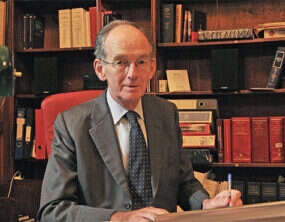
Journalists will be able to report much more detail about what they witness in England and Wales’s family courts under new plans to improve transparency.
Family courts president Sir Andrew McFarlane (pictured) has found the current system in which journalists can attend any hearing but not always report what they observe without making an expensive application to the court is “not sustainable”.
He called for a “major shift in culture and process” to improve transparency and pledged “clear and firm leadership” to ensure this happens.
“…the time has come for accredited media representatives to be able, not only to attend hearings, but to report publicly on what they see and hear,” he said.
“Any reporting must, however, be subject to very clear rules to maintain the anonymity of children and families, and to keep confidential intimate details of their private lives.”
‘Chilling effect’ on family court reporting
Sir Andrew’s transparency review said the work of the family court is “of significant importance” to society but is not currently subject to effective public scrutiny.
This has, in part, come about because journalists fear being held in contempt of court for reporting proceedings and so avoid covering them to a significant degree in case it is a waste of time and money.
“Justice taking place in private, where the press cannot report what has happened and where public information is very limited, is bound to lead to a loss of public confidence and a perception that there is something to hide,” Sir Andrew said.
Sir Andrew said he had heard of the “chilling effect” restrictions in Section 12 of the Administration of Justice Act 1960 has had on the reporting of family cases, which restricts the publication of information relating to proceedings in private, and urged Parliament to review it in favour of something more fit for purpose.
He said: “Section 12 is a somewhat opaque provision, and the fear of breaching it and the costs involved in litigation have acted as a major disincentive to journalists and others reporting on family cases.”
The Family Procedure Rules Committee can put in place rules that mitigate the effect of Section 12, however, he said.
Sir Andrew proposed reversing the presumption that something cannot be reported, to a presumption that it can, although it would remain at the discretion of individual judges whether non-parties to a case should be excluded.
He also said anonymity of the children and the family in court reports must be maintained and he will produce guidance on how to achieve this.
The new system will start with a trial run in two local authority areas, one urban and one rural, to make sure the changes work well and any issues are resolved before a national rollout. This will be monitored by the Transparency Implementation Group Sir Andrew intends to appoint to lead all the changes.
Consideration will be given to whether a family court reporting pilot framework developed by journalist Louise Tickle with support from the Bureau of Investigative Journalism and funding from the Rowntree Foundation should be adopted as part of the changes.
‘Relationship of trust’
Sir Andrew said he would establish a media liaison committee comprised of journalists, media lawyers and judiciary which would be part of work to establish a “relationship of trust and confidence”, helping to ensure reporting is “reliable and well informed”. In addition the president should establish links with the Society of Editors while, nationwide, there should be better links between circuit judges and the local media.
Sir Andrew cited the words of former Family Division president Sir Nicholas Wall who said 15 years ago: “There should be an ongoing dialogue with the press and the media generally about family justice and how it is administered. We, the judiciary and the practitioners, have nothing to fear from public scrutiny: indeed, we should welcome it.
Sir Andrew said: “I agreed with those words at the time and they remain just as valid today.”
He also said: “There is understandable and justified concern amongst family judges and magistrates that media reporting may result in journalists distorting or misunderstanding the court process in order to produce a ‘good story’ which is neither accurate nor justified by what took place in court.
“It will be necessary to monitor the reporting, both locally and nationally, and, where clear misreporting occurs, for it to be taken up with the relevant editors. In this regard both the limited trial run and the establishment of a forum for discussion between the family judiciary locally and nationally will be important.”
Amid several other proposals, journalists and bloggers should be given access in advance to court lists identifying the general nature of the proceedings, the category of hearing and a time estimate. Currently they can often only see the case number and initials of those involved.
Judges will also be asked to published anonymised versions of at least 10% of their judgments each year – although still a low percentage, this would be a “very significant” increase in current output.
As it stands, the number of published judgments has fallen from 222 in 2015 to 87 in 2019.
Family members will also be more free to speak to journalists without fear of being held in contempt.
The Bureau of Investigative Journalism’s managing editor and chief executive Rachel Oldroyd said: “The ability to report on this crucial area of the justice system has been too difficult for too long.
“As a society, we should be able to see more of this process that goes right to the heart of the role of the state in family life and relationships. We at TBIJ welcome the chance to explore how that reporting could be done carefully and sensitively in the public interest.”
Picture: Courts and Tribunal Judiciary
Email pged@pressgazette.co.uk to point out mistakes, provide story tips or send in a letter for publication on our "Letters Page" blog
